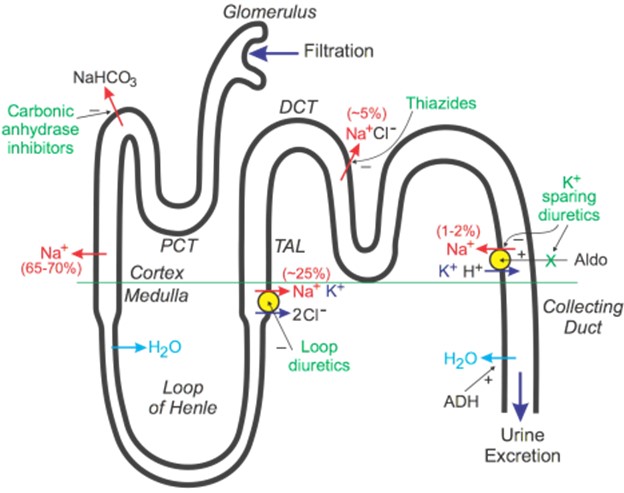A nurse is caring for a client who is taking furosemide. For which of the following adverse effects should the nurse monitor?
Hypervolemia
Hypertension
Hypoglycemia
Hypokalemia
The Correct Answer is D
Furosemide is a loop diuretic that helps the body get rid of excess fluid by increasing urine output. However, it also promotes the loss of potassium in the urine, leading to a potential decrease in the body's potassium levels.

Nursing Test Bank
Naxlex Comprehensive Predictor Exams
Related Questions
Correct Answer is ["A","D"]
Explanation
From the given statements, the nurse can identify the following statements as indicating the effectiveness of cimetidine treatment:
"I don't have as much heartburn after I eat anymore.": Cimetidine is a histamine-2 receptor antagonist commonly used to reduce stomach acid production. Decreased heartburn after eating suggests that the medication has been effective in reducing excessive acid production and relieving heartburn symptoms.
"I can sleep while lying flat again.": Cimetidine can help alleviate symptoms of gastroesophageal reflux disease (GERD) by reducing stomach acid. Improved ability to sleep while lying flat suggests that the medication has successfully reduced acid reflux and related symptoms.
The following statements do not directly indicate the effectiveness of cimetidine treatment: ● "I noticed that I have had less urge to smoke lately."
● "I occasionally have stomach pain and dark stools."
● "I have not been as dizzy as I was before."
These statements may be unrelated to the effects of cimetidine or may require further assessment to determine their significance. It's important for the nurse to address any concerns or symptoms mentioned by the client and evaluate their overall response to the medication
Correct Answer is A
Explanation
Sucralfate works by forming a protective barrier or coating over the surface of the ulcer. It adheres to the ulcer site and provides a physical barrier that protects the ulcer from gastric acid, pepsin, and bile salts. This protective barrier allows the ulcer to heal by preventing further damage and irritation from the stomach acid.

Whether you are a student looking to ace your exams or a practicing nurse seeking to enhance your expertise , our nursing education contents will empower you with the confidence and competence to make a difference in the lives of patients and become a respected leader in the healthcare field.
Visit Naxlex, invest in your future and unlock endless possibilities with our unparalleled nursing education contents today
Report Wrong Answer on the Current Question
Do you disagree with the answer? If yes, what is your expected answer? Explain.
Kindly be descriptive with the issue you are facing.
